李观仪《新编英语教程(1)》(第3版)学习指南-Unit 5至Unit 8【圣才出品】
- 格式:pdf
- 大小:1.27 MB
- 文档页数:110
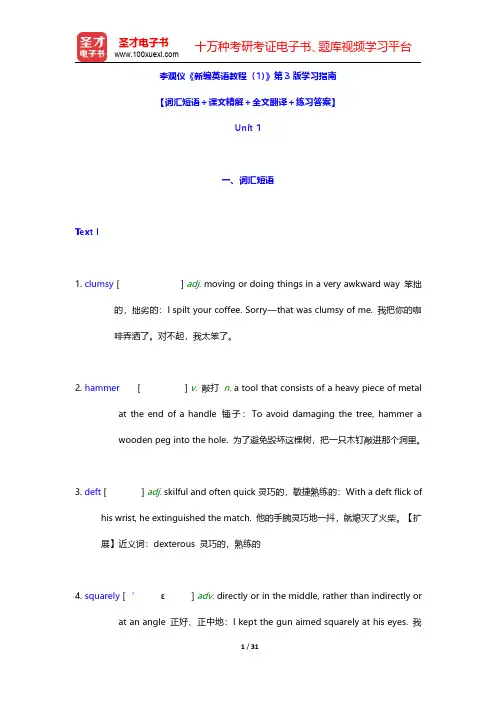
李观仪《新编英语教程(1)》第3版学习指南【词汇短语+课文精解+全文翻译+练习答案】Unit1一、词汇短语Text I1.clumsy[]adj.moving or doing things in a very awkward way笨拙的,拙劣的:I spilt your coffee.Sorry—that was clumsy of me.我把你的咖啡弄洒了。
对不起,我太笨了。
2.hammer[]v.敲打n.a tool that consists of a heavy piece of metalat the end of a handle锤子:To avoid damaging the tree,hammer awooden peg into the hole.为了避免毁坏这棵树,把一只木钉敲进那个洞里。
3.deft[]adj.skilful and often quick灵巧的,敏捷熟练的:With a deft flick ofhis wrist,he extinguished the match.他的手腕灵巧地一抖,就熄灭了火柴。
【扩展】近义词:dexterous灵巧的,熟练的4.squarely[‘ɛ]adv.directly or in the middle,rather than indirectly orat an angle正好、正中地:I kept the gun aimed squarely at his eyes.我一直把枪直直瞄准他的眼睛。
5.apt[]adj.exactly suitable适当的,恰当的:The words of this report are as apttoday as in1929.这份报告的措辞在当今如在1929年一样恰当。
6.scrupulous[]adj.correct even in the smallest detail;exact严格认真的,审慎的:You’re being very scrupulous,but to whatend?你表现得很认真,但目的是什么呢?7.subtle[]adj.not very noticeable or obvious细致的,微妙的,不易察觉的:The truth is subtly different.事实略有不同。
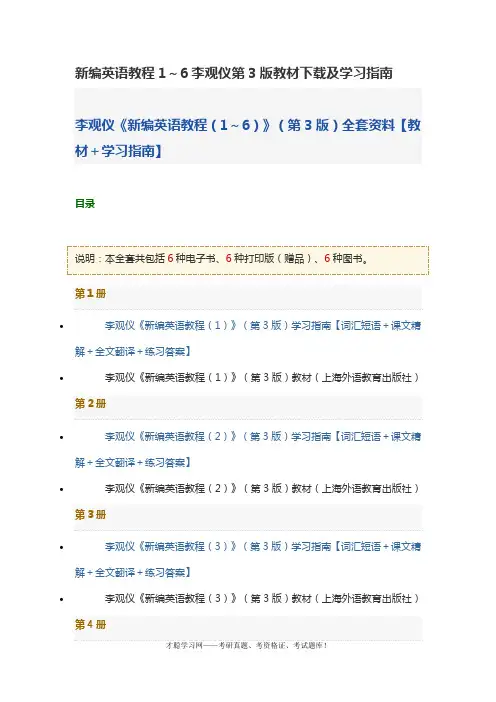
新编英语教程1~6李观仪第3版教材下载及学习指南李观仪《新编英语教程(1~6)》(第3版)全套资料【教材+学习指南】目录•李观仪《新编英语教程(1)》(第3版)学习指南【词汇短语+课文精解+全文翻译+练习答案】•李观仪《新编英语教程(1)》(第3版)教材(上海外语教育出版社)•李观仪《新编英语教程(2)》(第3版)学习指南【词汇短语+课文精解+全文翻译+练习答案】•李观仪《新编英语教程(2)》(第3版)教材(上海外语教育出版社)•李观仪《新编英语教程(3)》(第3版)学习指南【词汇短语+课文精解+全文翻译+练习答案】•李观仪《新编英语教程(3)》(第3版)教材(上海外语教育出版社)•李观仪《新编英语教程(4)》(第3版)学习指南【词汇短语+课文精解+全文翻译+练习答案】•李观仪《新编英语教程(4)》(第3版)教材(上海外语教育出版社)•李观仪《新编英语教程(5)》(第3版)学习指南【词汇短语+课文精解+全文翻译+练习答案】•李观仪《新编英语教程(5)》(第3版)教材(上海外语教育出版社)第6册•李观仪《新编英语教程(6)》(第3版)学习指南【词汇短语+课文精解+全文翻译+练习答案】•李观仪《新编英语教程(6)》(第3版)教材(上海外语教育出版社)•试看部分内容Unit 1一、单元语法本单元主要涉及一般现在时、现在完成时、一般过去时和一般将来时的被动语态。
被动语态表示主语是动作的承受者,由“助动词be+过去分词”构成,表达“被、受、由”之意。
一般用于以下几种情况:(1)不知道谁是动作的执行者I t i s f o u n d t h a t T o m w a s m u r d e r e d.有人发现汤姆被谋杀了。
(2)没有必要指出谁是动作的执行者Fresh fruit is so ld in this marke t.这个市场出售新鲜水果。
(3)强调动作的承受者“A Tale of Two Citie s”was written b y Dicken s.《双城记》的作者是狄更斯。
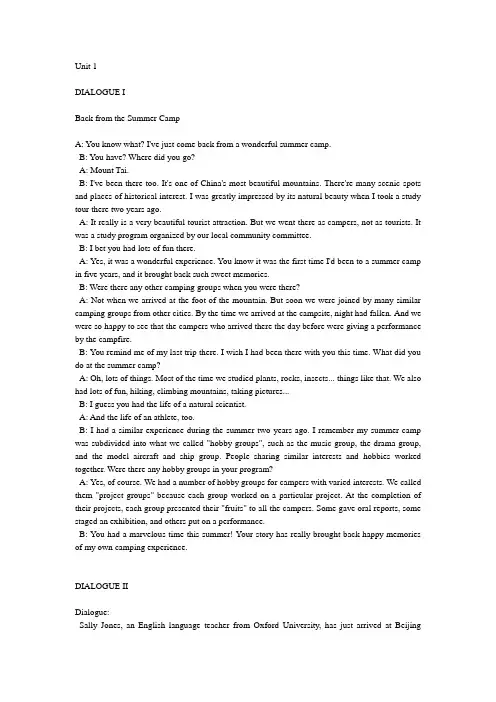
Unit 1DIALOGUE IBack from the Summer CampA: Y ou know what? I've just come back from a wonderful summer camp.B: Y ou have? Where did you go?A: Mount Tai.B: I've been there too. It's one of China's most beautiful mountains. There're many scenic spots and places of historical interest. I was greatly impressed by its natural beauty when I took a study tour there two years ago.A: It really is a very beautiful tourist attraction. But we went there as campers, not as tourists. It was a study program organized by our local community committee.B: I bet you had lots of fun there.A: Yes, it was a wonderful experience. Y ou know it was the first time I'd been to a summer camp in five years, and it brought back such sweet memories.B: Were there any other camping groups when you were there?A: Not when we arrived at the foot of the mountain. But soon we were joined by many similar camping groups from other cities. By the time we arrived at the campsite, night had fallen. And we were so happy to see that the campers who arrived there the day before were giving a performance by the campfire.B: Y ou remind me of my last trip there. I wish I had been there with you this time. What did you do at the summer camp?A: Oh, lots of things. Most of the time we studied plants, rocks, insects... things like that. We also had lots of fun, hiking, climbing mountains, taking pictures...B: I guess you had the life of a natural scientist.A: And the life of an athlete, too.B: I had a similar experience during the summer two years ago. I remember my summer camp was subdivided into what we called "hobby groups", such as the music group, the drama group, and the model aircraft and ship group. People sharing similar interests and hobbies worked together. Were there any hobby groups in your program?A: Y es, of course. We had a number of hobby groups for campers with varied interests. We called them "project groups" because each group worked on a particular project. At the completion of their projects, each group presented their "fruits" to all the campers. Some gave oral reports, some staged an exhibition, and others put on a performance.B: Y ou had a marvelous time this summer! Y our story has really brought back happy memories of my own camping experience.DIALOGUE IIDialogue:Sally Jones, an English language teacher from Oxford University, has just arrived at BeijingAirport. She is going to spend three months here, lecturing and teaching at different colleges and universities. Miss Wang, Secretary of the English Department, and Mr. Y u, Vice Chairman of the English Department, have come to the airport to meet her.Miss Wang: Excuse me, are you Miss Jones?Sally: Yes, that's right.Miss Wang: Oh, how do you do? I'm Wang Xinfu, Secretary of the English Department.Sally: Oh, yes, Miss Wang, hello. I'm very pleased to meet you. (They shake hands.)Miss Wang: Miss Jones, may I introduce you to Mr. Y u, Vice Chairman of the English Department?Mr. Y u: Hello, Miss Jones, I've been looking forward to meeting you.Sally: How do you do? (They shake hands.) It's very kind of you both to come and meet me at the airport.Miss Wang: Not at all. I hope you had a good flight.Sally: Well, not too bad. It was a bit bumpy as we came in to land; some low clouds, I think. Mr. Y u: Y es, we had a storm here yesterday and the weather is still a bit unsettled.Sally: Oh, dear! I was rather lucky then!Miss Wang: Y ou must be rather tired after your long flight.Sally: Well, yes, I am actually... I've been travelling for 21 hours!Mr. Y u: In that case, I think we should go straight to the hotel.Miss Wang: Yes, I agree. This way then, ... if you'd like to follow me.READING IHerbert's HomecomingHerbert Marshall was a student at Cambridge, but his hometown was St. Albans. It was August and the family had gone to the seaside. Herbert went to France for his holiday, but he ran out of money, and came home a week earlier than he had expected to.His train didn't get into St. Albans until just before midnight. The last bus had gone, so he had to walk home. He let himself into the kitchen, and as he was feeling hot and sticky, he took off his shirt to have a wash.Suddenly he heard heavy footsteps running up the path. The back door burst open, and he found himself surrounded by policemen. They pushed him into the living-room next door, made him sit down, and began asking him question."What's your name?""Where do you live?""What's in that case?""What are you doing here?""I live here," said Herbert, "I've been on holiday." But nobody listened to him. They just went on asking questions. Then suddenly one of the policemen said:"Watch him, Frank — we'll go and search the house."They left a tall, very young policeman to guard him."Can I put my shirt on?" asked Herbert."No," said the policeman, "stay where you are."Then the others came back with an older man, a sergeant. He asked the same questions, but he listened to Herbert's answers."I live here," said Herbert, "and I want to put my shirt on." The sergeant looked at him thoughtfully."We'll soon settle this," he said.He went out and came back with a small, sandy-haired man wearing a shabby, brown dressing-gown. It was Herbert's next-door neighbor. He peered at Herbert intently through thick spectacles."Oh, yes, sergeant," he said, "That is Mr. Marshall." Then he disappeared very quickly. The policemen all looked dreadfully disappointed. They were convinced they had caught a burglar. "Did he ring you up?" asked Herbert. The police sergeant nodded."He saw a light and understood your family had all gone away to the seaside."When they had all gone, Herbert made himself a cup of coffee.Unit 2DIALOGUE IA Trip to HuangshanA: Y ou visited Huangshan during your summer vacation, I heard. How was the trip?B: Oh, it was great! Y ou ought to go there some day if you haven't been there already.A: I certainly will one of these days when I have a chance. I've heard so much about it. What do you think is the best time to go to Huangshan?B: Well, it's very crowded there in summer. Y ou know, summer is always a busy tourist season for resorts like mountains and beaches. And it's too cold to go there in winter, so I wouldn't suggest the winter season, either. Besides, we can't afford the time when school is in session. So I would say the best time for college students to visit Huangshan is the first few days of the summer break when people haven't started doing anything yet.A: I see. How long does the whole the whole trip take, including the time on the road?B: It all depends, really. If you go there by train, four days should be enough. Y ou can also take a bus, which takes a longer time and is less comfortable, but as a trade-off, you'll be able to enjoy lots of country scenes and perhaps you'll save some money, too. Besides, the coach will take you directly to the foot of the mountain, or, if you like, midway up the mountain.A: I'll go by bus, then. But how long does it take from Shanghai?B: A one-way bus ride takes about twelve hours.A: Wow, twelve hours on the road!B: And on narrow winding roads when you're almost there.A: Does the bus stop for a rest on the way?B: Oh, yes, of course. Although there's a john at the back of the coach, it stops every three or four hours for you to relax and stretch yourself, and take meals.A: That sounds good. If I can afford the time, I think I'll take the bus. Incidentally, I heard that Huangshan is famous for its clouds, pine trees and rocks. Could you tell me when is the best timeto see the clouds and where I can find the famous pine trees and the unique rock formations?B: Well, as soon as you've made up your mind, I'll tell you what to look for and where to see them. A: Do you think I should go by myself, or take a package tour with a travel agency.B: I can't say which is better. They each have advantages and disadvantages. Anyway, the most important of all is that you must go and see for yourself.A: Thank you very much for all the information. Y ou know, I'm beginning to think about the trip very seriously.DIALOGUE IIDialogue:Map of NewtownA stranger standing at point x stops someone and asks him the way to the station.A: Excuse me.B: Y es.A: Could you tell me how to get to the railway station, please?B: The railway station? Let me think... yes, take the third turning on the right and it's opposite the park.A: The third turning on the right. I see... is it far?B: No, not really, only a few minutes.A: Oh, good, thank you very much.B: Not at all.READING ILeaving HomeWhen I told my mother, she looked at me as if I had slapped her face."What? Live in London?" she said."I just feel it's time I saw a little more of the world. After all, mum, I'm twenty-two!"Just then, my father came downstairs, looking relaxed as he always did after his Sunday afternoon nap. I had chosen the moment carefully."Clive wants to leave home. He doesn't want to live with us any more," she told him in a trembling voice. My father's expression changed."What? Y ou aren't serious, are you, son?" he asked. He sat down at the table opposite me. Perhaps my parents wouldn't have reacted this way if they hadn't spent all their lives in a small village in Wales. And perhaps my mother in particular wouldn't have been so possessive if her only other child hadn't died as a baby. I tried to explain to them that the bank I worked for had offered me a chance to take a job in their head office. But I didn't dare tell them I had already accepted the job."London's a long way away. We'll hardly see you anymore," my father said."I can come back at weekends, dad."He shook his head, looking more and more like someone who had just been given a few months to live by his doctor."I don't know, son. I don't know."He shook his head again and then got up and walked out into the garden.My mother and I sat there at the table. In the silence, I could hear the old clock ticking away in the hall. There were tears in my mother's eyes. I know she was going to put pressure on me to give up the idea, and I wondered if I could stand up to it. I even began to wonder if it was wrong of me to want to leave my family, the village and the people I had known all my life to live among the English in their cold, strange capital.She put her hand over mine."Y our father hasn't been well lately. Neither have I. Y ou know that. But we won't stand in your way if it's what you really want," she said.Unit 3DIALOGUE IA New Life on the University CampusLu Hua goes back to her secondary school to visit Wang Laoshi, her former English teacher. Wang Laoshi asks her about her life and study in the English Department at Pujiang University.A: Hello, Lu Hua. Nice to have you back. How are things at the university?B: Everything's fine, Wang Laoshi. Life at the university is so exciting and challenging.A: Do you live on campus?B: Not the whole time... I mean not on weekends. A university rule says that no freshmen should live off campus during the weekdays, unless the university authorities give permission.A: It's a good rule for new students. But you don't have to eat in school cafeterias, do you?B: No, we don't. But we prefer to eat there because there's a wide variety of foods on the menu, which changes every day. Besides, the food service is much better than that of most secondary schools. For one thing, our campus cafeterias are under the management of a professional food service company with an annually-renewable contract.A: I suppose you buy meal plans, then.B: Most of us do. We have IC cards for meals and pay on a monthly basis.A: That's very convenient. Well, how do you like your campus environment in general?B: The university has two campuses, one for freshmen and sophomores, and the other for juniors, seniors and graduate students. My campus is located on the outskirts of the city. It's a new campus, very peaceful, and free from the hustle and bustle of a metropolis.A: And free from all sorts of distractions and diversions that most city dwellers find it hard to escape or ignore.B: Y es, it's another plus when you live away from urban attractions.A: Did you have any orientation program about campus life for entering students?B: Y es. It was a three-day orientation, including a campus tour. We tried to learn as much aspossible about the university. We visited libraries, classroom buildings, language labs, the multimedia resource centre, computer support services, the student club, and the sports stadium. A: Do you freshmen have access to all these resources and technical facilities on a regular basis? B: Absolutely. They are open to all students. As a matter of fact, we're encouraged to make the most of the libraries and technical support services on the campus.A: Being an English major, do you have to speak English with your fellow students and English teachers most of the time?B: Yeah. We're expected to speak English with all our English teachers, whatever courses they teach. We're also encouraged to speak English in the dorm area as much as possible. We're not quite used to this "English only" environment, though. Anyway, we're all trying very hard.A: Good for you. It always takes time to adjust to a new environment. I suppose there are English lectures and talks available to you.B: Yes. They are given to us English majors periodically, and they cover a variety of topics. Not only that, we are encouraged to attend the free discussion session following each lecture or presentation. Most of the lectures are given by native-speakers, and unfortunately, I have a difficult time figuring out much of what they say.A: It takes time to understand lectures by native speakers. But they are very good for students majoring in English.B: Y es, indeed. There's no reason whatsoever for me to skip any of them.A: Well, your life at the university sounds very good. It's such a delight to know that one of my students is doing fine at the university. Come and see me again when you have a chance.B: I certainly will.DIALOGUE IIDialogue:A: When did you last go to London?B: Oh, I don't know really. I suppose it was about thirty, or, maybe even forty years ago.A: As long as that? Y ou wouldn't recognize it now.B: Has it changed very much?A: Oh, yes! It's changed beyond belief. It's a lot bigger of course and it's been cleaned up quite a lot.B: What about the fog?A: Oh, London doesn't have fog any more. That's all disappeared and the air has been cleaned considerably over the last thirty years or so.B: Do you think I'd still recognize it?A: Of course you would. Parts of London haven't changed very much at all, but in other areas the change is incredible.B: Is that cinema still open, the one at the corner of the street where I used to live? Y ou remember it, the "Rex", I think.A: No, that was knocked down about ten years ago. It's been replaced by a large supermarket. The small park has been destroyed, too, and the road has been widened. I think a new block of flats will be built there in a few years' time.B: What a pity! That park used to be very beautiful, and peaceful, too, in the summer.A: Even the old grocery shop isn't there anymore. It's been turned into a small restaurant.B: Is the man still there who used to deliver coal?A: No, unfortunately, he died five years ago, but his son still runs the business. He hasn't got a horse and carriage any more. The coal is delivered by lorry. He's doing very with the business, too; next year they'll have two lorries.B: Well, that's progress! Y ou know, I don't think I'd like to go back to London somehow.A: I go to London more often now than I used to, so I don't notice the changes now.B: I think it's been changed too much. I want to remember it as it was.READING IThe PressMore newspapers per person are sold in Britain than in any other country. Some believe that this proves that the British are more civilized and more interested in current affairs than other people; cynics look for other explanations.Certainly the geography of the country helps. Because Britain is such a relatively small country, it is possible to buy national newspapers published in London anywhere in the country on the same day. In most parts of the country, papers are actually delivered to houses by the local newsagent before breakfast.Daily papers are printed every morning in London and important provincial centers. National papers, available everywhere in the country, cover a wide range of political views and journalistic styles. Quality papers include The Guardian, The Daily Telegraph and The Times, while more popular papers include The Daily Mirror, The Daily Express, The Sun and The Daily Mail. On the whole, papers in Britain are perhaps less extreme than in some countries; they are less obviously committed politically and less dramatic and sensational in content.As well as national daily papers, there are Sunday papers, again divided between the serious (e.g., The Sunday Times, The Sunday Telegraph and The Observer) and the more popular (e.g., The Sunday Mirror, The Sunday People, News of the World).Some large towns also evening papers containing local as well as national and international news, and nearly everywhere in the country is served by a local weekly paper. This is devoted exclusively to local news and events, and is a very good source of information about what is happening in a particular town or village.Of course the press means more than newspapers. A vast range of magazines are published, aimed at readers interested in all sorts of subjects. If you go into a newsagent's shop in a large town you will find weekly and monthly magazines produced for people with interests from angling to zoos. However, if you judge from this evidence, most British women are interested mainly in knitting and cooking and most British men are interested mainly in cars and football. Can this be true?Unit 4DIALOGUE IStruggling with Taking DictationA: Gosh, look at this, seventeen mistakes in my dictation exercise again! That's terrible. I'm really sick of the whole dictation business.B: Relax, relax. This is not the end of the world. It happened to me too. Just take it easy and let me know what the problem is.A: The problem is that I don't believe I'll ever be able to take dictation in English decently. It gets on my nerves each time I have to do it.B: Come on, it can't be as bad as all that. Let me know if I can help you in any way.A: I started all right each time, but ended up with missing words, even phrases.B: Did you listen carefully when the dictation passage was read to you?A: Of course. I believe I listened to Wu Laoshi's reading very carefully, and tried to take down every word she read to us. What happened was that I was able to write down only the first few words of each sentence. I just couldn't hold complete sentences in my memory while writing.B: Did you have trouble understanding what you had to write?A: Understanding? What has that got to do with taking dictation? It's dictation. All I have to do is to write down what Wu Laoshi dictates.B: I'm afraid that is exactly the problem with your dictation, never trying to make sense of what you hear. How can you hold in your memory something you don't even try to understand?A: I still don't see what you mean.B: I mean you should take advantage of the first reading and try to know the main idea of the whole passage. Then you're on your way to becoming a 'dictation master'.A: Don't tease me. All I want to be is an average dictation taker. What exactly should I do after the first reading?B: In my opinion, when you begin to write, you don't want to listen to each sentence read to you as a group of isolated words, but as a meaningful unit.A: I focused my attention on individual words so that I wouldn't miss a single one. Every word counts when the dictation work is graded, you know.B: I'm afraid that was another reason why you failed to do dictation well. I know every word counts. But each phrase, and each sentence, counts more. If you focus only on isolated words without making sense of the whole sentence or of the whole passage, you will miss more than a few words. On the contrary, if you understand a group of words as a meaningful sentence, the words will come to you more easily.A: I see. Y our advice is very helpful. I think I'm beginning to understand. Thank you for your advice.B: Y ou've welcome.DIALOGUE IIDialogue:Elizabeth meets her interpreter in the hotel lobby for breakfast. They have been in Beijing fortwo days and are returning to Shanghai in two hours.Int: Hello, Elizabeth. How are you?Eliz: Fine, thanks.Int: Are you sure you're all right? Y ou look a bit worried today. Is there anything wrong?Eliz: Well, yes, there is something wrong actually. Perhaps you can give me some advice.Int: Of course, if I can.Eliz: Well, last night when I returned from the theatre, I found that I'd lost my wallet.Int: Oh, dear! That's terrible! What was in your wallet?Eliz: Well, some money, of course, my visa, all my identity cards and some photos.Int: Well, if I were you, I'd go to the police station straight away and report it.Eliz: Y es, I've already done that, and they said they'd make a search for it. But we're leaving soon and I need my visa and identity cards badly.Int: Oh, dear! What a pity! Are you sure you lost the wallet in the theatre?Eliz: Y es, quite sure.Int: I think you should put an advertisement in the China Daily, saying when and where you lost it.Eliz: But that takes too long.Int: Wait a minute! I know! How stupid of me. My uncle lives in Beijing and he lives very close to the theatre. I'll telephone him and ask him to go there. Y ou'd better go and have breakfast and I'll meet you later.Eliz: Oh, thank you. That's marvelous. I hope he find it.READIGN IA Source of EnergyEveryone needs and uses energy. If there were no energy, there would be no life.Most of the energy on this planet comes from the sun, but people do not receive that energy directly. It comes from different sources and in different forms.Green plants convert the sun's energy to food energy that animals and people use for life. The energy from animals had been used for hundreds of years to operate farm equipment and to pull carts, wagons, and other vehicles.The sun's energy takes water from rivers, lakes, and oceans and returns it to the earth in the form of rain or snow. When rain or snow falls on the land, some of it flows into rivers and streams. This flowing water can be used to produce mechanical energy and electricity. Water can also be converted to steam, which produces energy to operate machines.Winds also come from solar energy. Air that has been heated by the sun rises and creates winds. The power of winds has moved ships on the sea, ground grain, and brought water from the earth. There is also solar energy in oil, wood, and coal. There fuels have been formed over many centuries from plants. People burn them to produce heat and to create power for machines. Coal and oil are used to produce electrical energy, too. And electricity produces light, heat, and sound energy. In addition, electric power operates many kinds of equipment, tools, and machines, which make work easier.The need for power increases every day, and some sources of energy are being used up very quickly. So scientists and technicians are trying to find new ways to produce power. Nuclear energy, cow manure and garbage have become energy sources. But probably the most promising source of energy is solar heat. Some scientists suggest using these different sources of energy together. If this were done, it would be a way to create all of the power people need.* * *If All the Seas Were One SeaIf all the seas were one sea,What a great sea that would be!If all the trees were one tree,What a great tree that would be!If all the axes were one axe,What a great axe that would be?If all the men were one man,What a great man that would be!And if the great man took the great axeAnd cut down the great treeAnd let it fall into the great sea,What a great splash that would be!Unit 5DIALOGUE ILearning Chinese as a Foreign LanguageA: Hi, Xiaohua!B: Hi, David, how's everything?A: Good. So far so good, I mean.B: Y ou've been in China for two months. How do you like your CFL program in the Chinese Department?A: My interest in Chinese grows with each passing day. So does my difficulty in learning Chinese. It's such a difficult language! It's go different from European languages, such as English and French.B: As a learner of English as a foreign language, I'm going through a similar ordeal. I have difficulty with spelling, pronunciation and, believe it or not, with numbers and figures.A: But you speak English so much better than I do Chinese. I wish I were able to talk to native speakers in Chinese the way you are talking to me.B: Y ou will. Only it takes time.A: I know. "Rome was not built in a day."B: And “只要工夫深,铁杵磨成针”, as the Chinese saying goes.A: Which means...?B: Which means "Dripping water wears away stone", or "Where there's a will, there's a way." By the way, what do you find most difficult with your Chinese learning?A: The grammatical structure of Chinese doesn't seem to be as complex as I used to think. In many ways it is simpler than most European languages. No verb agreement, no irregular verbs and nouns, very few and simple tense markers, to name just a few.B: On the other hand, these are exactly the causes of some of the major problems I have with my English learning.A: But the Chinese writing system is altogether new to me. Instead of neat rows of 26 simple alphabetic letters, there are tens of thousands of unique characters formed with a varied number of strokes. Many of these characters seem complex. Although the calligraphy of Chinese characters is artistically beautiful, I won't be able to appreciate it until I can recognize and write at least 8,888 Chinese characters. I'm just kidding.B: How does Chinese sound to you?A: I find Putonghua rather melodious, a little like singing.B: Basically, Chinese is a tonal language. I'm not sure if you have trouble with making distinctions of the four tones.A: Y es, I do. The tonal system of Chinese really bothers me. It's a major source of difficulty with my comprehension and pronunciation. It's so upsetting that most of the time I don't understand what I hear and am not understood by others.B: I suggest you take advantage of living in China and go to lectures, movies, and plays "8,888 times", and dip yourself in the language environment as much as possible. Before I forget, I have two tickets for a newly-released feature film. Would you like to go with me and improve your listening for the tones?A: Certainly! Thank you so much.B: My pleasure.DIALOGUE IIDialogue:Two English teachers from a foreign language university in China are talking about a book called Beijing opera and Mei Lanfang. One of the teachers saw a Beijing opera a week ago and bought the book afterwards; the other teacher didn't see the opera, but is interested in buying the book. A: Where did you buy it?B: In the bookshop. It wasn't very expensive.A: What does the book say about Beijing opera? I don't know anything about it.B: Well, neither did I before I read the book. It says that the Beijing opera is a very old art form, over hundreds of years old.A: Do you think I should buy it?B: Y es, if you are interested. It tells you all about the history, the famous actors, the costumes and what all the different movements mean.A: What's the difference between Beijing opera and Western theatre?。

李观仪《新编英语教程(5)》(第3版)学习指南【词汇短语+课文精解+全文翻译+练习答案】目录Unit 1 一、词汇短语 二、参考译文 三、课文注释 四、练习答案Unit 2 一、词汇短语 二、参考译文 三、课文注释 四、练习答案Unit 3 一、词汇短语 二、参考译文 三、课文注释 四、练习答案Unit 4 一、词汇短语 二、参考译文 三、课文注释 四、练习答案Unit 5 一、词汇短语 二、参考译文 三、课文注释 四、练习答案Unit 6 一、词汇短语 二、参考译文 三、课文注释 四、练习答案Unit 7 一、词汇短语 二、参考译文 三、课文注释 四、练习答案Unit 8 一、词汇短语 二、参考译文 三、课文注释 四、练习答案Unit 9 一、词汇短语 二、参考译文 三、课文注释 四、练习答案Unit 10 一、词汇短语 二、参考译文 三、课文注释 四、练习答案Unit 11 一、词汇短语 二、参考译文 三、课文注释 四、练习答案Unit 12 一、词汇短语 二、参考译文 三、课文注释 四、练习答案弘博学习网————各类考试资料全收录内容简介《新编英语教程(第3版)学习指南》按照原教材的课次进行编写,每单元涉及单元语法、词汇短语、参考译文、课文精解以及练习答案等内容,旨在帮助学生更好、更高效地学习和掌握教材中的重点及难点知识,具有很强的针对性和实用性。
在编写过程中,该书力求突出重点,答疑难点,语言言简意赅,讲解深入浅出,希望它能得到广大英语专业学生和英语自学者的喜爱和认可。
弘博学习网————各类考试资料全收录Unit 1一、词汇短语Text I1clumsy [5klQmzi] adj. moving or doing things in a very awkward way 笨拙的,拙劣的:I spilt your coffee. Sorry—that was clumsy of me.我把你的咖啡弄洒了。
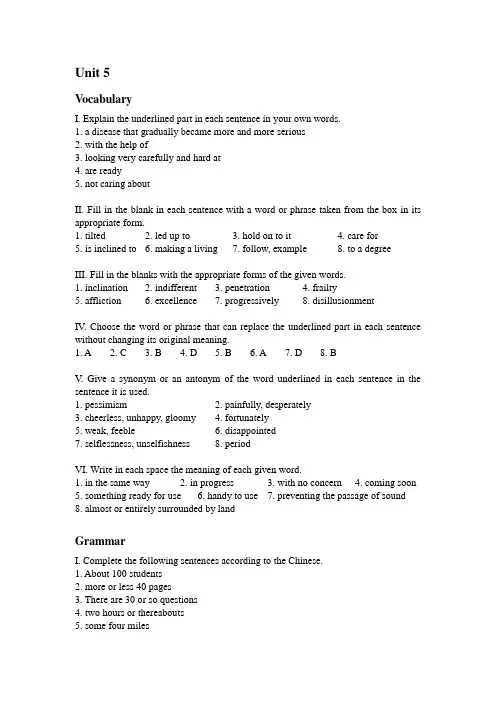
Unit 5VocabularyI. Explain the underlined part in each sentence in your own words.1. a disease that gradually became more and more serious2. with the help of3. looking very carefully and hard at4. are ready5. not caring aboutII. Fill in the blank in each sentence with a word or phrase taken from the box in its appropriate form.1. tilted2. led up to3. hold on to it4. care for5. is inclined to6. making a living7. follow, example8. to a degreeIII. Fill in the blanks with the appropriate forms of the given words.1. inclination2. indifferent3. penetration4. frailty5. affliction6. excellence7. progressively8. disillusionmentIV. Choose the word or phrase that can replace the underlined part in each sentence without changing its original meaning.1. A2. C3. B4. D5. B6. A7. D8. BV. Give a synonym or an antonym of the word underlined in each sentence in the sentence it is used.1. pessimism2. painfully, desperately3. cheerless, unhappy, gloomy4. fortunately5. weak, feeble6. disappointed7. selflessness, unselfishness 8. periodVI. Write in each space the meaning of each given word.1. in the same way2. in progress3. with no concern4. coming soon5. something ready for use6. handy to use7. preventing the passage of sound8. almost or entirely surrounded by landGrammarI. Complete the following sentences according to the Chinese.1. About 100 students2. more or less 40 pages3. There are 30 or so questions4. two hours or thereabouts5. some four miles6. 50ishII. Explain the meaning of the italicized parts.1. a nap2. very good indeed3. in a mess4. on hands and knees5. very much better than you are6. talking quickly and continuously7. very probably8. a lot of waysIII. Correct the errors, where found, in the following sentences.1. three-quarter →three quarters2. was →were3. plus 25 years →25 years plus4. second time →a second time5. see →have seen6. hour →hours7. 29 →Twenty-nineIV. Fill in the blanks with both, each, either or neither.Both, both, Neither, neither, both, each, eitherV. Put in some, any or one of their compounds.1. somewhat2. something3. some4. somehow5. anything, something6. something7. anything8. someVI. Make sentences of your own after the sentences given below, keeping the parts in italics in your sentences.1. In spite of everything I just said, I will still join the trip.In spite of the shortages, people became healthier by eating good, simple foods.2. It seems to me that here’s little chance of the situation changing in the near future. It seemed to her that the whole thing was a waste of time.TranslationI. Translate the following sentences into Chinese.1. 常言道猫有九命,我信这话,因为我已经活第三回了,尽管我并不是猫。
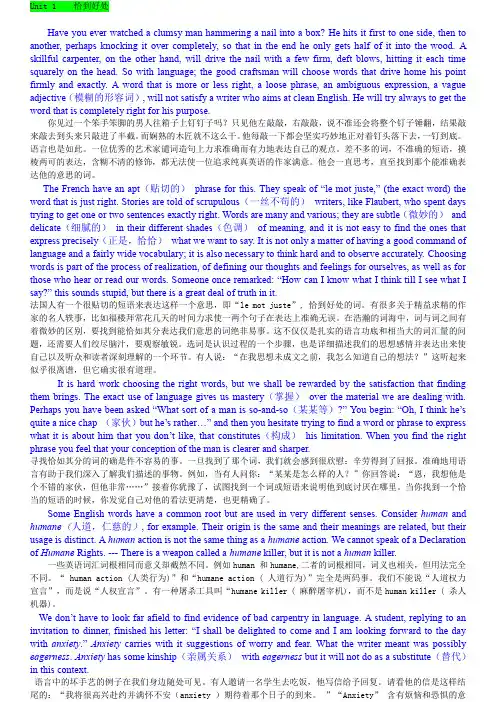
Unit 1 恰到好处Have you ever watched a clumsy man hammering a nail into a box? He hits it first to one side, then to another, perhaps knocking it over completely, so that in the end he only gets half of it into the wood. A skillful carpenter, on the other hand, will drive the nail with a few firm, deft blows, hitting it each time squarely on the head. So with language; the good craftsman will choose words that drive home his point firmly and exactly. A word that is more or less right, a loose phrase, an ambiguous expression, a vague adjective(模糊的形容词), will not satisfy a writer who aims at clean English. He will try always to get the word that is completely right for his purpose.你见过一个笨手笨脚的男人往箱子上钉钉子吗?只见他左敲敲,右敲敲,说不准还会将整个钉子锤翻,结果敲来敲去到头来只敲进了半截。
而娴熟的木匠就不这么干。
他每敲一下都会坚实巧妙地正对着钉头落下去,一钉到底。
语言也是如此。
一位优秀的艺术家谴词造句上力求准确而有力地表达自己的观点。
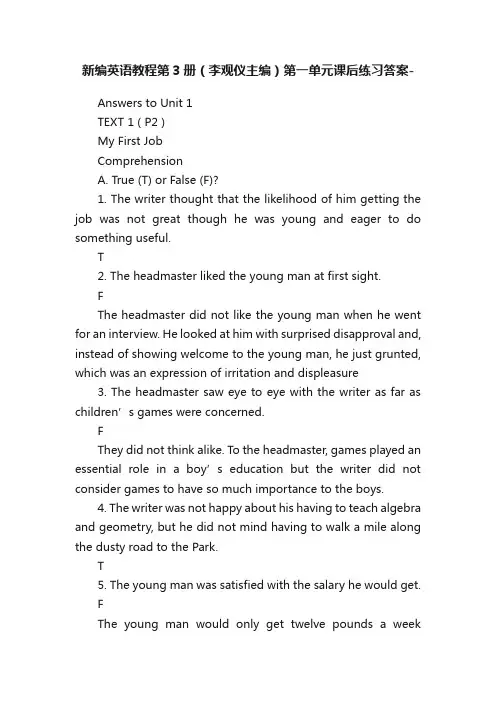
新编英语教程第3册(李观仪主编)第一单元课后练习答案-Answers to Unit 1TEXT 1 ( P2 )My First JobComprehensionA. True (T) or False (F)?1. The writer thought that the likelihood of him getting the job was not great though he was young and eager to do something useful.T2. The headmaster liked the young man at first sight.FThe headmaster did not like the young man when he went for an interview. He looked at him with surprised disapproval and, instead of showing welcome to the young man, he just grunted, which was an expression of irritation and displeasure3. The headmaster saw eye to eye with the writer as far as children’s games were concerned.FThey did not think alike. To the headmaster, games played an essential role in a boy’s education but the writer did not consider games to have so much importance to the boys.4. The writer was not happy about his having to teach algebra and geometry, but he did not mind having to walk a mile along the dusty road to the Park.T5. The young man was satisfied with the salary he would get.FThe young man would only get twelve pounds a weekincluding lunch, which was by no means good pay. Of course the writer was not satisfied. However, before he could say anything about the poor pay, the headmaster had stood up and asked the young man to meet his wife.6. The writer did not feel unhappy at the idea of working under the headmaster’s wife.FThe writer thought it was something he could hardly bear. To him, for a young man to work under a woman would be shameful and would result in a loss of dignity and self-respect.B. Explain the following in your own words.1. Being very short of money and wanting to do something useful, I applied, fearing as I did so, that without a degree and with no experience of teaching my chances of landing the job were slim. Because I was in bad need of money and was eager to do something of use, I applied for the job. But at the same time that I did so, I was afraid that the possibility for me to get the job was very small because I didn’t have a university degree, nor did I have any teaching experience.2. ...three days later a letter arrived, summoning me to Croydon for an interview.… three days later I received a letter, asking me to go to Croydon to have an interview.3. He looked at me with an air of surprised disapproval, as a colonel might look at a private whose bootlaces were undone.He cast a look at me with the same surprise and dislike as a colonel would look at a soldier when his bootlaces came loose.4. The headmaster and I obviously had singularly little in common.Apparently the headmaster and I had no similar interests orbeliefs.5. The teaching set-up appalled me.The way teaching was organized filled me with terror (or, I was shocked at the teaching arrangements).6. I should have to split the class up into three groups and teach them in turn at three different levels.I should have to divide the class into three groups of three different levels and teach them one after another.7. It was not so much having to tramp a mile along the dusty streets of Croydon, followed by a crocodile of small boys that I minded, but the fact that most of my friends would be enjoying leisure at that time.I felt troubled not because I had to walk for a mile along the dusty streets of Croydon, followed bya group of boys, but because at that time most of my friends would be having a good time and relaxing.8. The prospect of working under a woman constituted the ultimate indignity.The fact that I would have to work under a woman in future made me feel totally humiliated.TEXT 2 ( P3 )How to Do Well on a Job InterviewComprehensionTrue (T) or False (F)1. Most people think that a job interview is a terrible experience.Key: T2. You’re often given a reason if you’re not hired after an interview.Key: FIf you don’t get the job, you’re rarely given any reason why.3. You should neither wear casual student clothing nor overdress yourself when going to aninterview.Key: T4. To demonstrate your ability to be politely sociable, you should initiate small talk before gettingdown to business.Key: FYou should follow the interviewer’s lead and should not initiate any small talk or drag it out.5. You should be frank and list all your flaws to the interviewer.Key: FYou’ll come across as more believable if you admit a flaw –but make it one that an employer might actually like.6. A thank-you note shortly after the interview is one more chance to help you make a goodimpression.Key: TTEXT 3 ( P4 )Comprehension1 FThe Times is to sell the benefits of the classified columns by telephone.2. T3. FEducation is important4. FDrive here is a noun, meaning a forceful quality of mind or spirit that gets things done or initiative (动力、干劲). Applicants must possess this sort of drive.5. FIt’s a job that anyone who thinks he is qualified can apply for.6. TGuided writing ( P5 )I love travelling by train. Fast expresses, slow local trains which stop at every station, suburban trains taking businessmen to their offices and home again; I enjoy them all. It must be the element of romance that attracts me. There is no romance on motorway, which is a box of metal and rubber on a strip of concrete, or in flying through the air in a pressurized tube from one identical plastic and glass airport to another. But trains are different. On a train, you can walk around, look at the scenery, observe your fellow passengers; whereas in a plane all you can see are the clouds and the back of other people’s heads. And then there are the stations. Some, I’m afraid, have become too like airport; others, fortunately, are old and dirty, full of unexpected details and with their own individual peculiarities. Traveling by train remains an adventure, as you try to interpret the timetable, persuade the booking office clerk to sell you a ticket and understand the incomprehensible messages coming over the loudspeaker system. Then there is that delightful uncertainty as you wonder whether you are on the right train, or the right part of the train. There’s nothing like it.Precis writing ( P7 )I applied for my first job before I entered university because I was short of money. The school where I applied for a job wasten miles away from where I lived and I was not sure if I could get the job. However, after a terrible journey I was so depressed that I no longer felt nervous. The Victorian schoolhouses stood amid fumes and dust main road. The headmaster was not at all scholarly, neither was the inside of the house academic looking. By and by I discovered that the headmaster and I had very little in common. He wanted me to teach twenty-four boys from seven to thirteen who, were to be split up into three levels. I had to teach everything including the subjects I abhorred (憎恶). Furthermore, I had to work on Saturdays too. The pay was low. To top it all, I had to work under a woman, the headmaster’s wife, who was the real manager of the school.Paragraph Writing( 略)Letter Writing (略)Comprehensive Exercises ( P9 )1. Spelling ( P9 )1. advertise2. suburb3. range4. interview5. quarter6. depress7. dreary8. indignity9. disapproval10. geometry11. singularly12. leisure2. Dictation ( P9 )The most important day I remember in all my life is the one on which my teacher, Anne Sullivan, came to me. It was the third of March, 1887, three months before I was seven years old. On the afternoon of that eventful day, I stood on the porch, dumb,expectant, I guessed from my mother’s signs and from the hurrying in the house that something unusual was about to happen, so I went to the door and waited on the steps. Hanging down from the porch was sweet-smelling honeysuckle. My fingers lightly touched the familiar leaves and blossoms which had just come forth to greet the sweet southern spring. I did not know what surprise the future held for me.I felt approaching footsteps. I stretched out my hand as I supposed to my mother. Someone took it, and I was caught up and held close in the arms of her who had come to help me discover all things to me, and, more than anything thing else, to love me.3. Listening Comprehension ( P10 )A. True (T) or False (F)?For false statements, write the facts.1. Henry would have liked his interview to begin at once.T2. The secretary waited in the manager’s office while the manager signed the letters.FThe manager signed the last letter and then rang the bell for his secretary to come in and take the letters away.3. The technical journals were very carefully arranged on the top shelf.FIt looked as if the technical journals might at any moment slip off the shelf and fall to the ground.4. The manager’s desk was very tidy.T5. The manager had no idea what job Henry had come for.FThe manager knew what job Henry had come for; he said, “You’ve come about our advertisement for a clerk in the accounts section, haven’t you?”B. Complete the following sentences with relevant information from the passage.1. The telephone rang just as the manager was explaining t that he was waiting for a long-distance call from Manchester.2. The manager apologized for keeping Henry waiting.3. The bookcase was so large that it covered the greater part of one wall.4. In the box which marked OUT, the manager dropped the letters which he had signed.4. Translation ( P10 )A. Translate the following sentences from Chinese into English.1.他们都认为他成功的可能性很小。
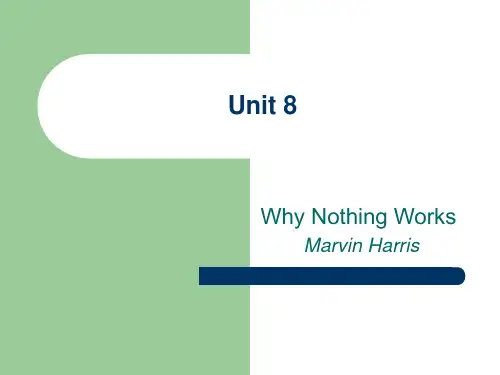
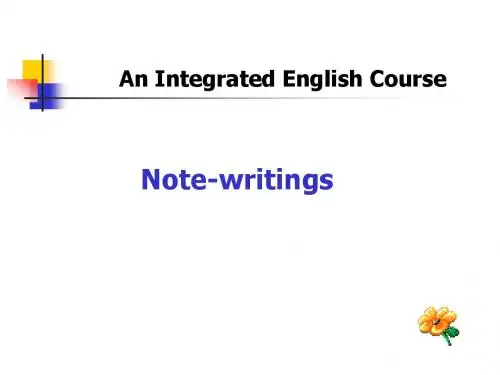
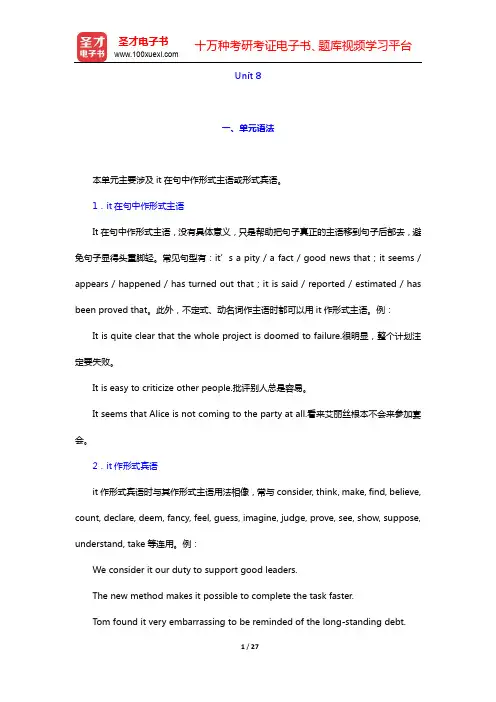
Unit 8一、单元语法本单元主要涉及it在句中作形式主语或形式宾语。
1.it在句中作形式主语It在句中作形式主语,没有具体意义,只是帮助把句子真正的主语移到句子后部去,避免句子显得头重脚轻。
常见句型有:it’s a pity / a fact / good news that;it seems / appears / happened / has turned out that;it is said / reported / estimated / has been proved that。
此外,不定式、动名词作主语时都可以用it作形式主语。
例:It is quite clear that the whole project is doomed to failure.很明显,整个计划注定要失败。
It is easy to criticize other people.批评别人总是容易。
It seems that Alice is not coming to the party at all.看来艾丽丝根本不会来参加宴会。
2.it作形式宾语it作形式宾语时与其作形式主语用法相像,常与consider, think, make, find, believe, count, declare, deem, fancy, feel, guess, imagine, judge, prove, see, show, suppose, understand, take等连用。
例:We consider it our duty to support good leaders.The new method makes it possible to complete the task faster.Tom found it very embarrassing to be reminded of the long-standing debt.Who can prove it wrong to have a “make-money-quick” mentality?注意:不定式动词短语前,可用for引出不定式短语的逻辑主语,使句子表意更明确,例:Many Chinese here find it necessary for them to have a better command of Chinese.Such a plan makes it possible for older workers to be re-trained as useful staff.二、词汇短语Language structures1. leak out(指情报)泄露,透露:Nobody knew how the secret had leaked out.没有人知道秘密是怎样泄露出去的。
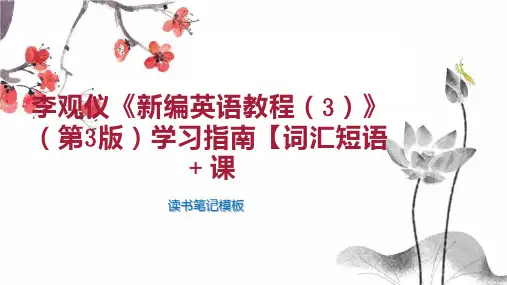
Unit5一、单元语法本单元主要讲真实条件句和非真实条件句。
1.真实条件句真实条件句用于陈述语气,假设的情况可能发生,其中if是“如果”的意思。
条件从句用一般现在时,主句用shall/will+动词原形。
例:If he comes,he will bring his violin.The volleyball match will be put off if it rains tomorrow.2.非真实条件句非真实条件句可以表示过去,现在和将来的情况。
它的基本特点是时态退后。
a)表示与现在事实相反。
从句用一般过去时,主句用should(would)+动词原形。
例:If they were here,they would help you.b)表示与过去事实相反。
条件从句用过去完成时,主句用should(would)have+过去分词。
例:If she had worked harder,she would have succeeded.If my lawyer had been here last Saturday,he would have prevented me from going.c)表示对将来的假想条件从句用一般过去时/were+不定式/should+动词原形,主句用should+动词原形。
例:If you succeeded,everything would be all right.If you were to succeed,everything would be all right.If you should succeed,everything would be all right.二、词汇短语Language structures1.sack[]vt.a)to place into a bag把……装入袋子;b)to discharge fromemployment解雇:He finally got sacked after a year of ineptitude.他不称职地工作一年后终于被解雇。
二、词汇短语Language structures1.vaccinate[]v.protect sb.(against a disease)by injectingvaccine给某人接种疫苗:vaccinate sb.against给某人接种疫苗以防止2.smallpox[]n.a serious disease that causes spots whichleave marks on your skin天花3.ceremony[]n.a formal act or set of acts performed asprescribed by ritual or custom典礼4.injection[]n.the act of injecting注射:Those drugs are givenby injection as well as through the mouth.那些药品可以注射,也可以口服。
5.indistinct[]adj.not distinct,vague不清楚的,模糊的:anindistinct image模糊的影像Dialogue1.stage fright怯场a feeling of fear or nervousness that some people have justbefore they appear in front of an audience2.intercollegiate[]adj.involving or representing two or more colleges.学院间的:intercollegiate athletic competition大学校际体育竞赛3.live[]adj.broadcasting while actually being performed实况转播的:a livetelevision program现场直播的电视节目4.turn tail逃跑;躲开to run away because you are too frightened to fight or attack:As soon as they see us come they turn tail and run他们一看见我们来了,掉头就跑。
Unit 1 恰到好处Have you ever watched a clumsy man hammering a nail into a box? He hits it first to one side, then to another, perhaps knocking it over completely, so that in the end he only gets half of it into the wood. A skillful carpenter, on the other hand, will drive the nail with a few firm, deft blows, hitting it each time squarely on the head. So with language; the good craftsman will choose words that drive home his point firmly and exactly. A word that is more or less right, a loose phrase, an ambiguous expression, a vague adjective(模糊的形容词), will not satisfy a writer who aims at clean English. He will try always to get the word that is completely right for his purpose.你见过一个笨手笨脚的男人往箱子上钉钉子吗?只见他左敲敲,右敲敲,说不准还会将整个钉子锤翻,结果敲来敲去到头来只敲进了半截。
而娴熟的木匠就不这么干。
他每敲一下都会坚实巧妙地正对着钉头落下去,一钉到底。
语言也是如此。
一位优秀的艺术家谴词造句上力求准确而有力地表达自己的观点。
新编英语教程第3册(李观仪主编)课后练习答案第8单元Text 1ComprehensionAnswers for reference:1. In English-speaking countries, when a male customer walks into a shop, an assistant oftengreets him by saying “Can I help you, sir?” This is considered a polite way of serving the customer and the assistant is required to do so. However, if a person goes into a bookshop and wishes to browse through the books before buying any, he does not want to be bothered by the assistant’s greeting. In a good bookshop, the assistant will thus not greet the customer as i s usually the case.2. After the assistant has answered the customer’s questions, he should go away quickly,appearing not to care whether he will sell a single book or not. The writer is trying to tell us that the assistant in the bookshop should let the customer browse through the cooks to his heart’s content without disturbing him in the slightest.3. Only when you have finished browsing and have decided which book or books to buy are youin need of his services.4. This refers to the statement “Boo k-sellers must be both long-suffering and indulgent.”5. He had not expected to be treated with such kindness.6. No. The first sentence means “There is a story which shows fully what I mean.” The secondsentence means “It so happened that the volume on the subject had a lot of pictures.”7. The owner of a bookshop must ensure that his customer will be able to spend a mostenjoyable time in his shop. Every customer, whether a book-lover or a person who happens to take shelter from a sudden shower, should be welcome to his shop. He must see to it that the assistants let the customer wander round the bookshop to his heart’s content without being disturbed. The owner or the assistant should lead the customer wherever he wants to go and allow him to browse for as long as he pleases. The owner must be both kind and patient. Answers for reference:1. Your wish to obtain a book with a lovely cover is so strong and powerful that you are incapableof resisting it, although this method of selecting a book is recommended.2. You are soon absorbed in a book…/Soon you give all your attention to a book and forgeteverything else…3. You can move about from one place to another until you are completely satisfied. /You canmove about in a shop like this for as long as you want.4. An assistant should remain relatively inconspicuous until you have finished looking at thebooks/reading.5. …something in which you had previously only had a slight interest.6. …In addition to getting large bills for the books, you can…7. …he was very disappointed to find that the book was not in the place where it was usually putand was on the point of leaving; just then he saw the owner of the shop signaling to him.8. Thinking that he would be scolded / rebuked, he went up to him.COMPREHENSIVE EXERCISESIV. TranslationA.1. Seeing the enemy planes approaching, they dashed off to look for a shelter from the bombs.2. I understand why she is working so hard day and night, for she has a great desire for success in this field.3. Jim was so engrossed in his computer games that he did not hear his mother call.4. On New Year’s Eve, all the boys and girls of the town sang and danced to their hearts’ content.5. The banker was found to have run up huge debts then he died.6. He was dismayed to hear that he was the only one who had failed the examination.7. The librarian saw the man tuck away the book in his overcoat and walk out of the reading-room.8. In the streets of New York you can see a great variety of people with different skin colours and from all walks of life.9. Over-indulgent parents may spoil their children.10. Take along an umbrella or a raincoat in case it rains and you may catch cold.B. Reference version:Shopping is an important human activity.The way people spend their money and the objects on which they spend it reflect personal taste.Yet shoppers are faced with a confusing and a rapidly changing situation which limits their expression of free choice and individuality. The confusion arises from the claims made by advertising and from inadequate information about products. The shoppers might become attracted by a certain material, and even be tempted to buy it. Usually the desire is irresistible. However, they often end up with buying things of an inferior quality. Apart from picking up a product of questionable quality, they can waste a large amount of money on things they do not really need.A wider choice of goods can also confuse them. Not knowing what to buy, they can wander around the shops for hours and hours, without buying anything, but wasting a great deal of time. V. Blank FillingA. 1. changed, promising 2. coming, qualified3. determined4. spoken, leading, surprising5. frightening6. demanding7. pleased, soiled 8. complicated9. interested, exciting, soaked 10. tiring, tiredB. 1. giving 2. Fascinated, rising/rise3. singing, to do, making4. keeping, playing, to be, to see, climbing5. opening6. to take, shopping, doing, to do7. to have remembered, to tell, preparing, to do8. to watch, to read, reading, watching9. missing, to tell 10. to be taken11. swimming, cleaning, to do 12. waiting, seeing, missing, to find, to beC. (1) for (2) to (3) of (4) on(5) read(6) across (7) about/for (8) in(9) until/till (10) opinion(11) by (12) keep(13) excellent (14) time (15) pleasure(16) from(17) yourself (18) in (19) filled (20) trains(21) but (22) meeting (23) things (24) attitude (25) forD. (1) speaking (2) before (3) by (4) few (5) developed(6) how (7) writing (8) step (9) or (10) of(11) found (12) from (13) ideas (14) used (15) the (16) first (17) represent (18) can (19) language (20) making(21) world (22) to (23) of (24) only (25) wayE. 1. (1) To his surprise (2) rushed(3) desire (4) irresistible(5) could be most enjoyable (6) wander(7) to their hearts’ content (8) inevitable greeting(9) to be tempted (10) ended up with(11) ran up a large account2. (1) was (often) told off (2) became engrossed(3) totally unaware (4) apart fromVI. Sentence Rewriting1. Whenever he…bookshop, he…away from it.2. Whoeve r he is, he…law3. Wherever he went, poor…life.4. Whatever you may say, I…thing.5. However hard he tries, he … satisfactory.6. Don’t …, whoever repeats it. / Whoever repeats it, don’t …7. However annoying his behaviour is/may be, we…him.8. Whatever he … say, I…going.9. Keep calm, whatever happens. /Whatever happens, keep…10. The boy…, wherever he is. /Wherever…, the boy…B. 1. To his great joy, his uncle…present.2. Much to our relief, the plane…la st.3. To the surprise of the teacher, Yang Ling had … heart.4. To our grief, Professor Hu died of cancer last week.5. To my satisfaction, his statement is correct.6. To the disappointment of the students, the book…bookshops.7. To their indignation, John was unfairly missed.。
四、课文精解Dialogue1.But how did you help yourself shift out of such an emotional state:词组shift out of…意为“使转移出……”,例:Let’s shift this rubbish out of the way.咱们把这些垃圾弄走。
2.So why not take it as a good thing:take在这里意为“把……看作,当作”,例:take…for granted认为……理所当然;Don’t take his remarks as an insult.别把他的话当作侮辱。
3.You bet:在文中You bet表示,“没错,你说的对”,表达或强调赞成某人的话。
此外,you bet亦可以表示赞成对方的提议,如:-Are you coming?-You bet.(-你来吗?-当然啦。
)4.I can see that self-confidence comes from preparation and practice:see在这里表示“明白”,且这个用法通常没有被动语态。
如:I see what you’re saying.我明白你说的了。
5.…you present an air of confidence in yourself and what you are communicating:air在这里表示“神态,姿态”,an air of confidence即“自信的神态”。
类似的还有:She looked at him with a determined air.她神情坚定地看着他。
Reading I1.…you’re less likely to live in a healthy manner:manner可以表示“方式”,in a…manner即“以……的方式”,如:in a friendly manner友好地;in a continuous manner连续地。